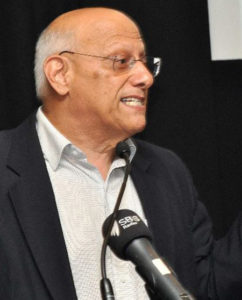Aussies accepting of immigration and diversity – Scanlon report
S upport among Australians for multiculturalism and immigration has weathered a significant uptick in the politicisation of the issue, according to the latest Scanlon social cohesion study.
upport among Australians for multiculturalism and immigration has weathered a significant uptick in the politicisation of the issue, according to the latest Scanlon social cohesion study.
The 2018 Mapping Social Cohesion survey, conducted by the Scanlon Foundation and
Monash University found more than four in five Australians see benefits to immigration and diversity.
The survey, which canvassed the views of 1,500 randomly chosen Australians, also found 52 per cent of Australians consider the current intake of migrants either ‘about right’ or ‘too low’. Forty-three per cent said the intake was ‘too high’.
Report author Professor Andrew Markus said the results challenged recent media and political narratives about rising concern over immigration and its impact on Australian society.
“The concerns we see are around overcrowding, the environment and house prices, not about immigration itself,” Prof Markus said.
“In the immigration space, the concerns are about how the government is managing population growth and infrastructure. And despite media reports and commentary, we found that things like crime and jobs were low-level concerns,” he said.
The 2018 study is the eleventh of its kind and in that time Australia has seen a population increase of 5 million with a quarter of current residents born overseas.
It found that the level of concern about immigration had risen by 6 per cent on last year but Prof Markus said this was in line with the issue becoming more contested politically.
The report found 82 per cent of respondents agreed that immigration was important to Australia because it brought in new ideas, 80 per cent agreed immigration was good for the economy but only 45 per cent were positive about the way the government manages population growth.
It found younger more educated people see diversity and the immigration intake of benefit to Australia.
“The leaders of tomorrow absolutely value multiculturalism and immigration,” Prof Markus said.
And he said that support for a migration policy that discriminated on the base or race, ethnicity or religion had very little support except among One Nation supporters.
“There are relatively low levels of concern about immigration from many different countries, about whether immigration is good for this country, creates jobs, gives us fresh ideas. All of those indicators remain, by large percentages, very positive,” Prof Markus said.
The report found 85 per cent of Australians thought multiculturalism was good for the nation with 64 per cent saying immigrants should change their behavior to become more like Australians and 65 per cent saying Australians should do more to learn more about the customs and heritage of ethnic groups.
Professor Markus said support for multiculturalism has remained steady over several years.
“Over the course of 11 years of surveying, more than anything, we’ve seen stability,” he said.
“We’ve got a question which asks people, ‘Do you think multiculturalism has been good for Australia?’ And there are lots of people out there telling you that multiculturalism is a disaster, it’s ruining the country. And we’re getting 85 per cent of people saying, ‘Yes, multiculturalism has been good’.”
“We’ve done that now more than five times. Each time, we’ve got pretty much the same result. It has always been in the range 83 to 86 per cent.”
We’re getting a majority of people saying, ‘Yes, multiculturalism has been good’, Prof Markus said.
The report found about one in five of those surveyed said they had experienced discrimination because of their religion, ethnicity or skin colour. That figure has not increased since 2016 but is up from 10 per cent in 2009.
It found a significant drop in support for government and federal politicians over the past decade.
“It collapsed during the Rudd-Gillard years, and it hasn’t recovered. So, it’s gone from 48 per cent down to around 30 per cent, and that’s where it’s stayed.”
This year’s survey provides a deeper insight into the perceived value of immigration to the country, and the issues influencing public opinion on immigration numbers.
“Beyond a narrow focus on the immigration intake, Australians continue to endorse the view that their country is an immigrant nation, and that immigration benefits the country,” Prof Markus said.
He said differences in attitudes to immigration were highlighted across different demographic groups.
Young people aged 18-29 with a Bachelor’s degree or higher shared the same level of concern as the general population about the impact of immigration on house prices (52 per cent) but were less likely to think immigrants increased crime, (seven per cent compared to 34 per cent), and that the immigration intake was too high (seven per cent, compared to 43 per cent).
“Among educated young people – a cohort which can be expected to have a major influence on the direction of Australian society in coming decades – there is zero disagreement with the proposition that accepting immigrants from many different countries makes Australia stronger,” Prof Markus said.












